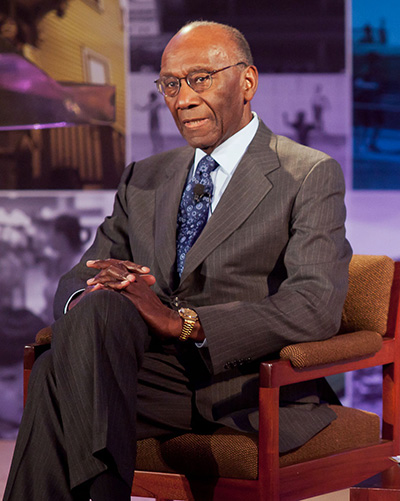NEWSLETTER
|
Forging “New Paths on Multiple Fronts” By Judy Barsalou
My preference for this fond remembrance of Frank Thomas is that it be filled with anecdotes that reflect intimate personal knowledge of him developed over his long tenure. The truth is that my best-remembered interactions with Frank occurred when I was starting at the Ford Foundation in 1982, limited by the fact that I was a very junior member of the program staff.
Part of an incoming wave of young women, initiated by Frank, who fundamentally altered the demographics of the Foundation’s staff in New York and abroad, I was a temporary, junior program officer whose duties involved backstopping the offices in Cairo and Khartoum and responsibility for all grantmaking in Israel. Based at the time in New York, I attended “Officers’ Meetings” whenever a grant focusing on the Middle East was under discussion.
Presided over by Frank, these meetings involved review of “Requests for Grant Action”, where program staff defended RGAs justifying grants of $50,000, which required Frank’s approval. If an RGA made it onto the agenda, chances were Frank would approve it at the meeting. But occasionally the presenting staff member faced a tough round of questions, and the proposed grant and its RGA were subject to further scrutiny, revision and rare disapproval.
Presentations at these meetings were always brief given that the RGAs were circulated in advance. Questions raised by Frank and others were probing but generally unemotional, and a great way for the greenest of junior program officers to learn about the Foundation’s priorities, strategies and values.
At the time, there was no document more sacred in the organization than the RGA, over which program staff labored. Draft RGAs were vetted by more senior officers before being allowed to land on the officers’ meeting agenda. Up to that point, the Foundation had a long history of grantmaking in Israel, which mostly included support for agricultural and social science research and related endeavors. But I had also inherited responsibility for a relatively new portfolio of grants that sought to improve relationships between Jewish and Palestinian civil society leaders.
My early travels around Israel exposed the disquietude of the latter and disinclination for continued participation because these encounters, held at universities and NGOs around the country, led to no concrete means of redressing legalized discrimination. Instead, Palestinian Israeli participants urged a civil rights approach to our work, inspired in part by the American civil rights movement of the 1960s.
Back to Frank: He presided over the officers’ meeting where I sought approval for a grant to Israel’s oldest human rights organization. But my presentation was followed by strident objection from one of the Foundation’s senior officers, a man decades older and infinitely more experienced than I, upset that the RGA addressed problems of law-based discrimination.
Frank listened quietly, thanked me for my efforts and indicated that he would give the RGA further thought. Later that day, Frank approved the grant, without amendment.
In his wisdom, Frank allowed the denunciation of the proposed grant without rebuke or explicit disagreement in the meeting. Clear in his own mind that this was a direction he wanted to follow, his respectful handling of a senior member of his management team preserved his relationship with him while approving the Foundation’s first explicitly human-rights-focused grant in Israel.
In his collegial and good-humored way, through this grant and many others, Frank led the Foundation to forge new paths on multiple fronts and demonstrated qualities that any young program officer would do well to emulate. Under his leadership, programming in the region began to pivot from land and water management, agricultural economics and maternal and child health, among other issues, to a more rights-based approach to development.
His mastery of such strategies in the United States was instrumental in informing work in overseas offices, and he often led without appearing to lead, a surprising quality for a physically imposing man whose quiet authority was exercised with a light touch.
His interest in diversifying the Foundation’s staff significantly increased the number of women, persons of color and, in the overseas offices, nationals from the region. These innovations profoundly affected programming and enhanced the credibility of the Foundation as an instrument of social justice.
He is much missed.
Judy Barsalou worked at the Ford Foundation from 1982 to 1990 and again from 2008 to 2011 in the New York headquarters, the Cairo office and the Developing Country programs.
_______________________
LAFF Remembers Franklin Thomas: Co-Presidents’ Reflections by Suzanne Siskel and Betsy Campbell
He Left the World a Better Place by Susan Berresford
A Man of “Vision, Tenacity and Dignity” by Barron “Buzz” Tenny
Celebrating the Remarkable Legacy of Franklin Thomas by Darren Walker
“A True Humanitarian” by Shepard Forman
From the Class of ’92: “We worked for Frank” by Radhika Balakrishnan, Mahnaz Ispahani Bartos, Natalia Kanem, Anthony Romero and Marcia Smith
Grantees: “Up Front and in the Center” by Charles Bailey
Taking Risks “Is What We Do” by Steven W. Lawry
A Leader With “Vision and Courage” by Barry D. Gaberman
Forging “New Paths on Multiple Fronts” by Judy Barsalou
“The Tallest Tree in Our Forest” by Akwasi Aidoo
|


